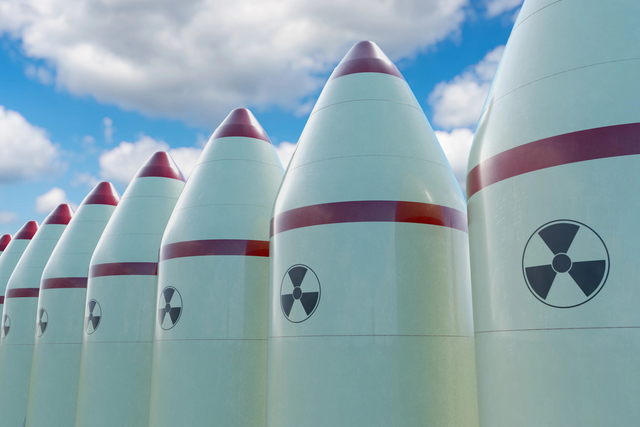
Thomas Schelling once argued that a tiny garrison in West Berlin could stop the Soviets: “They can die heroically… and in a manner that guarantees that the action cannot stop there.” The lesson seemed clear: symbolic courage could enforce credibility. History tells a different story. Small forces rarely deter determined aggressors – the British tripwire deterrence failed to prevent the Germans from overrunning Belgium in 1914, just as the US’s tripwire did not prevent North Korea from sweeping into South Korea in 1950. Deterrence depends on capability, not drama.
Ukraine faces the same problem. US President Donald Trump suggested the US could guarantee Kyiv security with air support. But low-capability tripwires rarely stop a militarily powerful adversary. Offshore, high-capability deployments are more credible – but costly and risky. A less conventional, but potentially more effective, path is nuclear latency: giving Ukraine the ability to assemble nuclear weapons quickly if needed, without fully deploying them.
JOIN US ON TELEGRAM
Follow our coverage of the war on the @Kyivpost_official.
Ukrainian President Volodymyr Zelensky has indicated that if NATO membership remains out of reach, Ukraine should explore a nuclear option. Latency signals that future conquest carries unacceptable risk. History supports this grim logic. Since 1945, no nuclear-armed state has been conquered. Nuclear weapons did not prevent all conflicts – Israel fought Egypt and Syria in 1973, India and Pakistan have clashed repeatedly – but they have reliably prevented all-out wars between nuclear powers. The United States and the Soviet Union never confronted each other directly, and the catastrophic potential of retaliation has restrained other major states.
Other Topics of Interest
Pentagon Demands Journalists Sign Pledge Not to Publish Certain Info or Lose Access
Reporters face new Pentagon rules requiring them to pledge not to publish sensitive info, giving the Defense Department sweeping control over coverage.
Nuclear latency offers Kyiv a middle path. It avoids permanent US deployments while providing credible deterrence. A latent program could include secure storage of fissile material and delivery systems designed to signal capability rather than immediate threat. Conventional alliances, economic resilience, and diplomatic support can reinforce the deterrent.
Nuclear latency directly addresses the commitment problem: assuring Kyiv without pulling the US into a prolonged conventional conflict.
Risks are real. Latency must be credible: half-measures or poorly secured programs invite miscalculation. Proliferation concerns could arise, and Moscow might misread the program as an imminent threat. The stability-instability paradox warns that latent nuclear power may deter total war while encouraging limited aggression at the conventional level. Careful diplomacy and safeguards are essential.
Compared with low-capability tripwires or temporary NATO guarantees, nuclear latency directly addresses the commitment problem: assuring Kyiv without pulling the US into a prolonged conventional conflict. It also reframes negotiations: a latent arsenal reduces the importance of territorial concessions, giving Kyiv leverage while signaling that further aggression carries catastrophic consequences.
No solution is perfect. Nuclear latency cannot reclaim territory or coerce Russia into changing behavior. But in a world where conventional deterrence has often failed, it may be the least-worst option. The logic is stark: credible nuclear potential makes conquest irrational.
For Ukraine, latent nuclear capability – backed by diplomacy, conventional defense, and economic resilience – could stabilize the conflict. Schelling’s heroic garrisons once aimed to deter by risking death; nuclear latency deters by making destruction unavoidable. In the long run, it may be the clearest path to peace and sovereignty: a deterrent so potent that Moscow has no rational choice but to respect Ukraine’s independence.
The views expressed in this opinion article are the author’s and not necessarily those of Kyiv Post.





